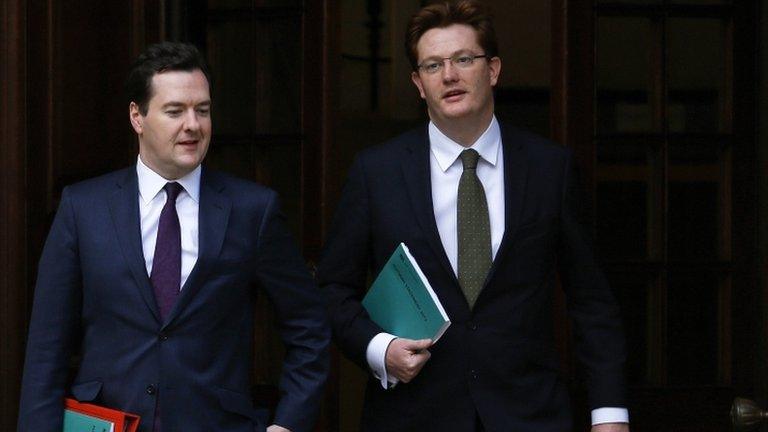Why are Tories so angry with Bercow?
- Published
- comments
Speaker Bercow deals with MPs in House of Commons
Has Speaker John Bercow overstepped the mark? That is the question that Conservative MPs and ministers were asking at the Spectator magazine's summer party last night.
The question was driven not by their anger at the Speaker's treatment of Defence Secretary Philip Hammond during the afternoon.
Mr Bercow repeatedly castigated Mr Hammond for his failure to distribute a list of Territorial Army bases that were to close in time for his statement to MPs. The defence secretary apologised but the Speaker kept raising the issue.
Here is just one example from Hansard of the Speaker's irritation:
"I have, in all sincerity and candour, to say to the Secretary of State that....the administration of this matter has been woefully inadequate and, frankly, utterly incompetent. I have not known a worse example during my tenure as Speaker. I know that the Secretary of State has expressed himself in his usual, rather understated, terms, but I hope he genuinely does feel some sense of embarrassment and contrition at what has been a total mishandling by his Department, for which he is solely responsible - it is as simple as that."
Nor was the Tory concern fuelled by Mr Bercow's apparent mistake earlier this week when he scolded the Conservative MP Ian Liddell-Grainger for heckling when in fact the guilty party was apparently international development minister Alan Duncan.
Again, this from Hansard:
"Order. I say to the hon. Member for Bridgwater and West Somerset (Mr Liddell-Grainger): be quiet, and if you cannot be quiet, get out. You are adding nothing, and you are subtracting a lot. It is rude, it is stupid, it is pompous and it needs to stop - whoever it was."
Nor were Tory MPs moaning at Mr Bercow's treatment yesterday of his old sparring partner, transport minister Simon Burns:
"The Minister of State is a slow learner, but he must try to grasp the point that it ill behoves a right hon. Gentleman who regularly shouts, hollers, chunters and accuses other people of all sorts of things from a sedentary position to make something of the fact that somebody else mutters from a sedentary position. I gently advise the Minister to raise his game and operate at the level of events. Minister of State, continue with the speech and the reading thereof."
Nor were Tories raising an eyebrow at the Daily Mail's latest calculation of how much the Speaker has cost the taxpayer in his travel expenses - £96,000 over three years.
No, the Tory worries were about the Speaker's intervention on Tuesday during the prime minister's statement on his trip to Afghanistan and last week's European summit.
Labour MP Gisela Stuart asked David Cameron why he had been forced to get a backbench MP, James Wharton, to introduce a private member's bill to implement the government's policy for an in-out EU referendum by the end of 2017. Mr Cameron said he did not explain the intricacies of parliamentary procedure to his European colleagues but he did make the case for reforming the EU and a referendum.
At this point, the Speaker rose and intervened to say:
"Order. Given that Ministers were originally proposing to have their names on the private Member's Bill, it is probably as well that the Prime Minister was not seeking to explain the intricacies of parliamentary procedure to his European colleagues."
This refers to the fact that Downing Street mistakenly tried to include the prime minister and the foreign secretary on a list of MPs sponsoring the Bill. They couldn't do this because otherwise the private member's bill would have become a government bill and therefore treated differently.
But what has angered Tory ministers and MPs was the Speaker's intervention. They thought it crossed a line. They thought the Speaker was not making a point about the administration or procedure of the House of Commons. They felt he was making a debating point.
Why, they asked, should the Speaker express his opinion about what the prime minister should or should not have said to his European counterparts?
"He has broken constitutional precedent," said one cabinet minister. "If an MP had raised that as a point of order, the Speaker would have dismissed it as a point of debate, not a point of order."
And this afternoon on the BBC's Daily Politics the Conservative MP Rob Wilson accused the Speaker of bias against his party - and claimed he had the statistics to prove it. Mr Wilson compiles a six-monthly survey of the Speaker's interventions which he claimed showed Mr Bercow was not playing by the rules.
"There is a suspicion that he fails to have a balanced and unbiased view of the House," said the MP. "He takes on Conservative MPs and ministers to a greater degree than he does Labour shadow ministers and MPs."
The bible of parliamentary rules, Erskine May, declares that "the chief characteristics to the office of Speaker in the House of Commons are authority and impartiality". Such is the importance of this principle that no MP is allowed to question it without risking a breach of privilege.
"Confidence in the impartiality of the Speaker is an indispensible condition of the successful working of procedure," it goes on. "He takes no part in debate either in the House or in committee."
I asked the Speaker's office for its thoughts but it is, for now, sticking to the convention that the Speaker's words in the chamber stand for themselves.
- Published26 June 2013
